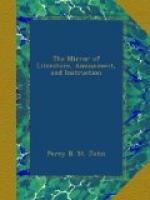“And as for the Earl of Belfast,
he’s a nobleman outright,
They all say this, both high and low,
all through the Iley Wight.”
Reverting to the aquatic scenery, the most prominent object amidst the “myriad convoy,” is the Commodore’s fine ship, the Falcon, 351 tons, lying out a mile and a half to sea. Contrasting her proportions with the numerous yachts around her, we might compare her commanding appearance to that of some mountain giant, seated on a precipice, and watching the trial for mastery amongst a crowd of pigmies below. Her state cabin has been decorated in a style of magnificence for a ball in the evening, at which 200 of the nobility and gentry are expected to be present. But all eyes are anxiously turned to the race. “Huzza for the Arrow,” is the acclamation from the crowd; and certain enough the swift Arrow, of 85 tons, Joseph Weld, Esq., has left her opponents, even the favourite Miranda spreads all sail in vain—the Arrow flies too swiftly, outstripping the Therese, 112 tons; the Menai, 163 tons; the Swallow, 124 tons; the Scorpion, 110 tons; the Pearl, 113 tons; the Dolphin, 58 tons; and the Harriet, 112 tons. Now she nears the starting vessel, gliding swiftly round it—the cannons on the battlements of Cowes Castle proclaim the victory—the music breaks forth “with its voluptuous swell,” amidst the applause of the multitude,—and his Majesty’s Cup is awarded to the Arrow.
The assemblage dispersing, we will adjourn to Paddy White’s, and refresh ourselves with a cup of his Bohea, rendered more agreeable by the company’s critiques on the sailing match. At this moment Cowes contains half the world; and every villa, and assembly-room, and tavern, and pot-house, from the superb club-house, with its metamorphosed lords, to the Sun tap, with its boisterous barge-men, are as happy as mortals can be. Just before oar departure for Newport, we will to the harbour, and take a farewell peep of the “finish” of Cowes’ Regatta. Though unwelcome night has prematurely interrupted the enjoyments of the multitude, it engenders a social pleasure to behold the numerous lights, forming almost a concentrated blaze—to hear the expiring cadence of the jovial song, excited by the second bottle—and to join in the bustle of the beach, where the company of the Falcon are embarking. But good bye to Cowes—we are already on the road to Newport; and the lateness of the hour may be conceived by the inmates of the rural inn, the Flower Pot, drawing the white curtains of each bed-room window. Reader, a word at parting. Art thou tired of the commercial monotony of the city, and wearied with its eternal aspect of brick? Has the efflorescence of thy youth been “sicklied o’er” by the wasting turmoil of the town?—leave its precincts for one month of the fervid summer, and forget thy cares and toils in the embowered Isle




